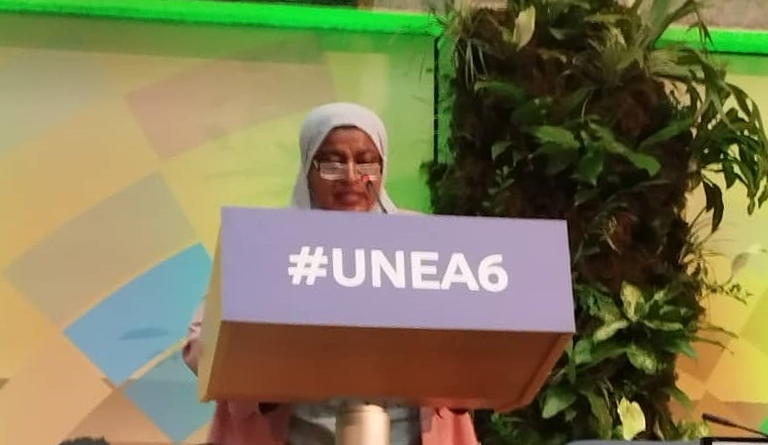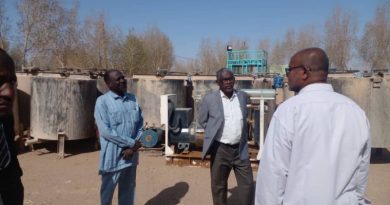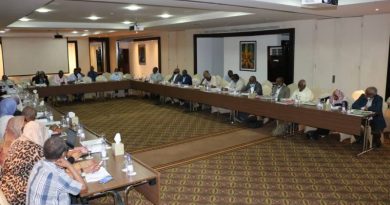Speech of the Republic of Sudan at the Sixth Session of the United Nations Environment Assembly
Nairobi, February 19 to March 1
Madam President of the Sixth Session,
Madam Executive Director of the United Nations Environment Programme,
Ladies and gentlemen, heads of delegations,
Distinguished guests,
Peace be upon you and the mercy and blessings of God.
We address you today as the world gathers these days to address the crisis of our planet, which is represented in climate change, loss of biodiversity, and pollution. My country is being subjected to the most heinous systematic environmental genocide, which was proven by a remote study. High-resolution satellite images have shown the damage inflicted on the most important biodiversity areas in the country.
The rare Acacia Senegal forest reserve has suffered extensive material damage as a result of being targeted by the rebel Rapid Support Forces (RSF) with shells, explosions, and fires.
Distinguished guests, we would like to inform you that this reserve was nominated to join the Ramsar List because it meets the criteria for recognition. As a recognized protected area, the reserve is home to about 250 species of resident and migratory birds, as well as rare mammals and reptiles. It also contains numerous plant communities and water bodies that form a unique model of biodiversity, which has given it its scientific importance, especially in the field of field studies and training of biologists and researchers. In addition, the Acacia Senegal reserve plays a major role in reducing the temperature as it is a carbon sink. It also enhances livelihoods by allowing the local population to use the forest for fishing, agriculture, and ecotourism.
Ladies and gentlemen,
In the same context, the Sudanese National Botanical Garden, the most important and oldest genetic resources garden in Africa, which is more than a hundred years old, was destroyed by the rebel militias. The Sudan Natural History Museum, which houses a variety of birds, reptiles, marine and river life, was also destroyed. These collections represent all the ecosystems that Sudan is rich in. This ancient museum, which was planned to celebrate its golden jubilee, is a source of scientific research for Sudan and abroad. The mercenary militias also destroyed the bird reserve located at the Jebel Awliya Dam south of Khartoum, in addition to destroying zoos that house rare animals and endangered species.
Biodiversity in the floodplains of the Nile, the Blue Nile, and the White Nile has also been affected, especially Tuti Island, which is a source of natural agricultural products.
The Crop Genetic Resources Center in Wad Madani was also vandalized by the militias. The importance of this center is that it is a source of seeds that adapt to different environmental conditions, especially since Sudan is the world’s food basket and a source of food security for the Arab world.
Ladies and gentlemen,
The rebel Rapid Support Forces (RSF) targeted industrial areas and oil depots, which led to air pollution with harmful chemicals, in addition to pollution from ammunition and military vehicles. The destruction of power stations by the militias has exacerbated the situation, leading to an increase in the use of fuel.
Distinguished guests,
The militias have worked to plant landmines and explosives, which leads to soil pollution and the leakage of chemicals into the soil and groundwater. It is worth noting that Khartoum State is located on a large groundwater basin that is an important strategic reservoir.
The militias also destroyed the Shambat Bridge, which led to the transfer of heavy pollutants such as lead to the river water and its living resources.
Another violation committed by the militias is the attack on the Central Laboratory, which includes vital and chemical laboratories, with the resulting diverse catastrophic effects.
Ladies and gentlemen,
We cannot ignore the issue of climate change, which has become one of the biggest issues preoccupying the international community due to its effects, which have been proven by reality and the Intergovernmental Panel on Climate Change (IPCC).
Sudan is considered one of the most affected countries by climate change, especially in the water, agriculture, health, and coastal areas sectors.
Ladies and gentlemen:
Climate change is a reality and a burden that hinders the achievement of food security and sustainable development, in addition to fueling conflicts over natural resources, which have been put under pressure after the increase in displacement to different areas due to the war.
In addition to the above, the war has hindered the implementation of environmental projects, especially climate change adaptation projects, natural reserves and biodiversity projects.
Ladies and gentlemen,
The environmental destruction has affected all the ecosystems that the Sudanese people depend on for their livelihood. The agricultural plains and pastures have been destroyed. This systematic destruction aims to displace the Sudanese people who have lost their decent livelihoods.
**The responsibility for the environmental genocide that the Republic of Sudan has been subjected to lies with the Rapid Support Forces militias and the state that supports them, which, despite its international condemnation, continues
The Responsibility for the Environmental Genocide in Sudan Lies with the Rapid Support Militia and the Supporting State
Despite international condemnation, the state that supports the Rapid Support Militia continues to provide the rebel militia with weapons that destroy the environment through some of Sudan’s neighboring countries. Therefore, the responsibility for repairing the damage caused by the war lies with these countries according to the principle of “who pollutes the environment cleans it up.”
I also call on this environmental forum, which is the highest environmental authority in the world, to take a clear stand against the countries that support the war that has the environment as its victim and criminalize them as enemies of the environment and not allow them to have a place in these meetings. I also urge international financing institutions and specialized international funds to give Sudan the utmost importance in providing financial and technical support to restore all the ecosystems that have been destroyed by the war and to expedite environmental recovery procedures. Delay means increased environmental degradation and thus increased technical and financial costs.
Distinguished Attendees
The time has come for this assembly to have a clear opinion on the construction of large dams on the upper reaches of international rivers, which have been scientifically proven to have harmful environmental effects on the areas downstream of the dam. Sudan has been harmed by the Ethiopian Renaissance Dam, which was built without prior environmental studies. This dam has caused environmental damage to Sudan, leading to the loss of floodplains, flood irrigation areas, the loss of natural soil fertilization, and the deprivation of groundwater basins from seasonal feeding. This is in addition to the deterioration of the quality of water flowing to Sudan and the infection of the population with water-borne diseases, the loss of fisheries and Nile forests, the decline and loss of wild animals and birds, and the contribution to climate change.
Reducing this environmental damage requires that the operation of the Renaissance Dam allow for the preservation of the natural seasonal flow of the Blue Nile by supporting the continuation of its flow and what it carries of silt and sediments to preserve biodiversity and protect the riverine, amphibious and terrestrial ecosystems associated with the Blue Nile and the Nile River.
In conclusion, we declare our commitment to environmental principles aimed at restoring harmony between us and the nature on which we live. Sudan also declares its commitment to all international environmental conventions and agreements and its unlimited cooperation in implementing its commitments, especially those related to climate change, biodiversity and pollution.
Thank you.




